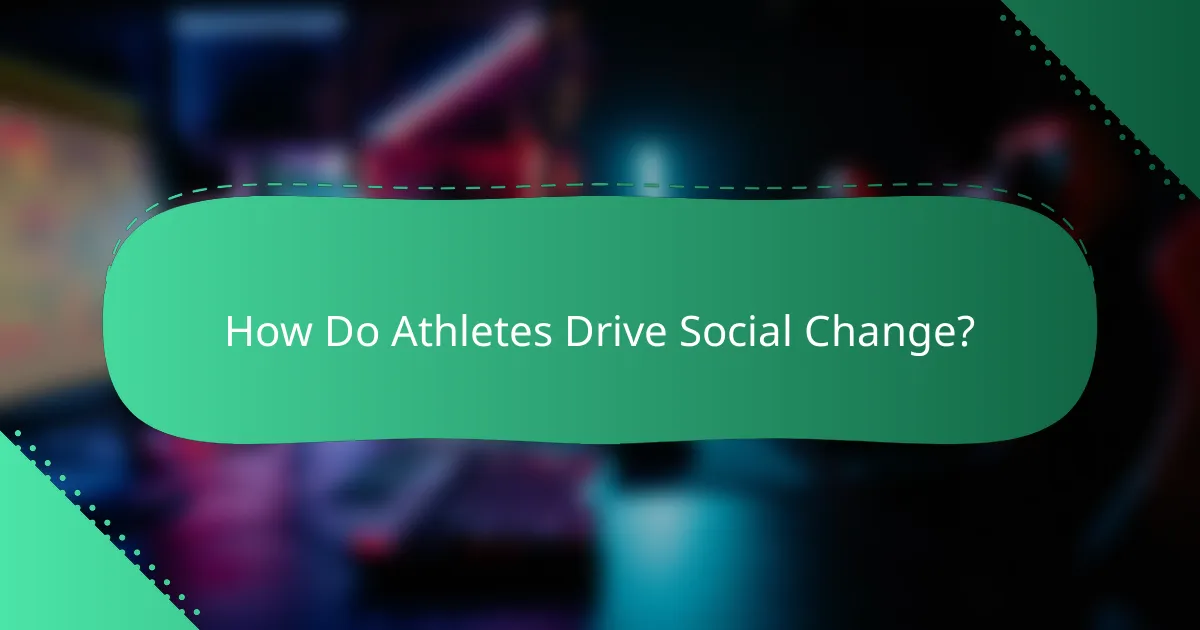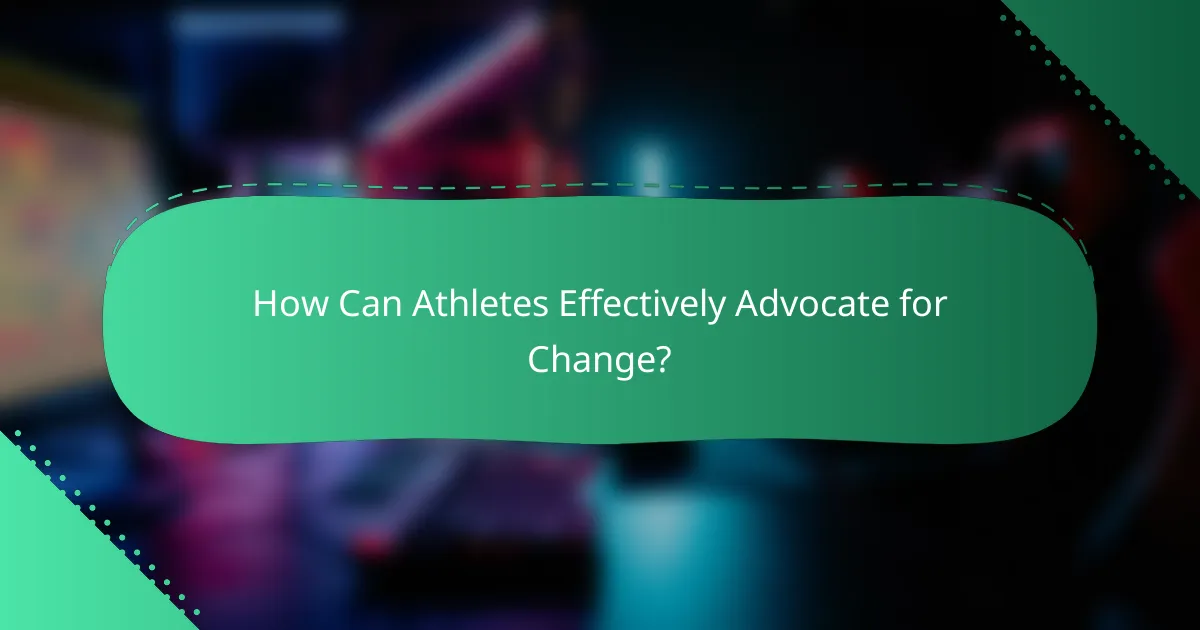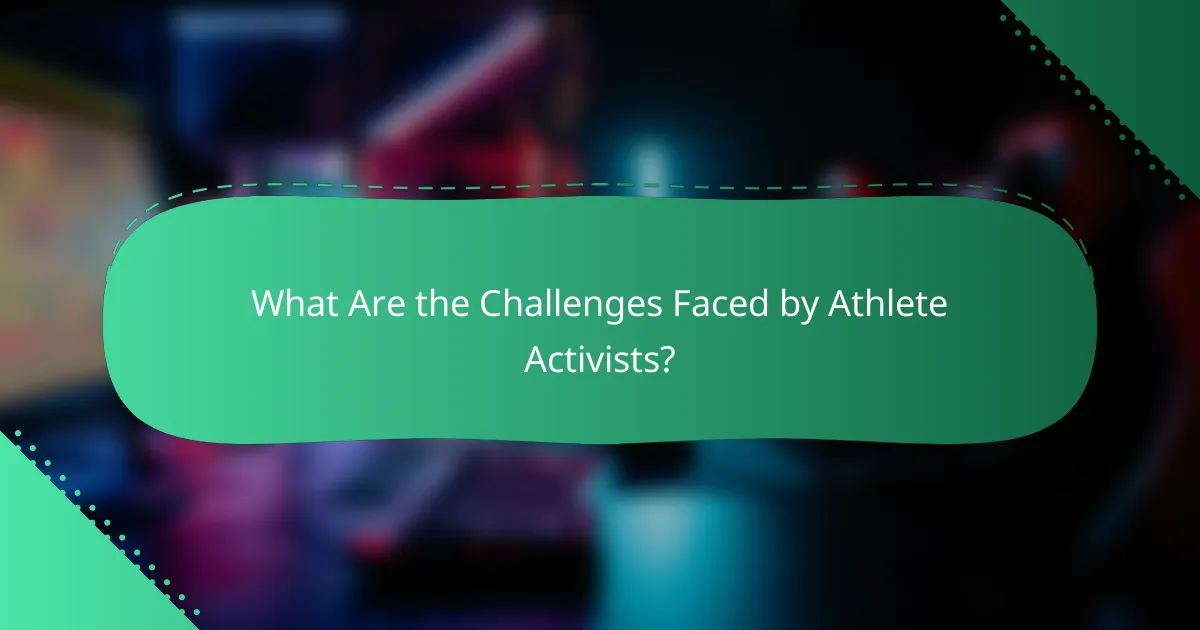Athlete activism plays a crucial role in driving social change by harnessing the power of visibility and influence. Through their platforms, athletes advocate for important issues, raise awareness, and inspire communities to engage in social justice efforts. These impactful stories not only highlight individual journeys but also encourage collective action towards meaningful reforms.

How Do Athletes Drive Social Change?
Athletes drive social change by leveraging their visibility and influence to advocate for important issues. They utilize their platforms to inspire action, raise awareness, and mobilize communities around social justice and equity.
Influencing public opinion
Athletes have a unique ability to shape public opinion due to their celebrity status and connection with fans. By speaking out on social issues, they can challenge prevailing narratives and encourage dialogue among diverse audiences.
For example, when prominent athletes publicly support movements like Black Lives Matter, they can shift perceptions and inspire fans to engage in discussions about race and equality.
Raising awareness on social issues
Through their platforms, athletes can highlight critical social issues that may otherwise go unnoticed. They often use interviews, press conferences, and public appearances to draw attention to topics such as mental health, climate change, and systemic inequality.
Campaigns like “Take a Knee” initiated by NFL players have successfully brought national attention to police brutality and racial injustice, prompting widespread conversations and actions.
Engaging in community initiatives
Athletes frequently participate in or create community initiatives that address local needs. By investing time and resources into their communities, they can foster positive change and inspire others to contribute.
Programs like LeBron James’ “I PROMISE School” demonstrate how athletes can directly impact education and youth development, providing resources and support to underserved populations.
Partnering with advocacy organizations
Many athletes collaborate with established advocacy organizations to amplify their impact. These partnerships can enhance credibility and provide athletes with the tools and resources needed to effectively address social issues.
For instance, athletes like Serena Williams and Colin Kaepernick have worked with groups focused on civil rights and social justice, leveraging their influence to support larger movements.
Using social media platforms
Social media serves as a powerful tool for athletes to share their messages and mobilize supporters. Platforms like Twitter and Instagram allow them to reach millions instantly, making it easier to raise awareness and drive engagement.
By posting about social issues, sharing personal stories, or promoting events, athletes can create viral movements that resonate with their followers and beyond. For example, hashtags like #BlackLivesMatter have gained traction through athlete endorsements, significantly increasing visibility and support for the cause.

What Are Notable Athlete Activism Stories?
Athlete activism stories highlight how sports figures use their platforms to advocate for social change and raise awareness on critical issues. These narratives often inspire fans and communities to engage in advocacy and promote social justice.
Colin Kaepernick’s kneeling protest
Colin Kaepernick’s kneeling protest during the national anthem in 2016 sparked a nationwide conversation about racial injustice and police brutality. His decision to kneel was a form of peaceful protest aimed at drawing attention to systemic racism in the United States.
The protest faced significant backlash, but it also inspired many athletes across various sports to join in solidarity. Kaepernick’s actions have led to increased awareness and discussions about the need for social reform and accountability within law enforcement.
LeBron James and voting rights
LeBron James has been a vocal advocate for voting rights, particularly in the context of voter suppression in the United States. He co-founded the organization More Than A Vote, which aims to combat misinformation and encourage voter registration and participation.
James emphasizes the importance of civic engagement, especially in marginalized communities. His efforts have included organizing events and partnerships to ensure that individuals have access to the resources they need to vote, highlighting the critical role athletes can play in promoting democracy.
Serena Williams on gender equality
Serena Williams has consistently used her platform to advocate for gender equality in sports and beyond. She has spoken out against pay disparities and discrimination faced by female athletes, pushing for equal treatment and opportunities.
Williams’ activism includes her involvement in campaigns that promote women’s rights and empowerment. By sharing her experiences and challenges, she encourages other women to fight for their rights and strive for equality in all areas of life.
Marcus Rashford’s campaign against child food poverty
Marcus Rashford has made significant strides in addressing child food poverty in the UK through his advocacy work. His campaign gained momentum in 2020 when he successfully lobbied the government to extend free school meals for vulnerable children during school holidays.
Rashford’s efforts have included raising awareness about food insecurity and collaborating with various organizations to provide meals to those in need. His activism has not only influenced policy but has also inspired other athletes to take a stand on social issues affecting their communities.

What Impact Does Athlete Activism Have?
Athlete activism significantly influences social change by raising awareness, advocating for policy reforms, and inspiring collective action. Through their platforms, athletes can drive discussions on critical issues, leading to tangible impacts in communities and beyond.
Changing policies and legislation
Athlete activism often leads to changes in policies and legislation by bringing attention to social injustices. For instance, campaigns led by athletes have resulted in reforms in areas such as criminal justice, education, and healthcare. By leveraging their visibility, athletes can pressure lawmakers to consider new legislation or amend existing laws.
Examples include the push for police reform following high-profile incidents of violence against marginalized communities. Initiatives like the “Black Lives Matter” movement have prompted legislative discussions in various U.S. states, aiming to address systemic racism and promote accountability.
Shaping public discourse
Athlete activism plays a crucial role in shaping public discourse around social issues. By speaking out, athletes can influence how the media and the public perceive topics such as racial equality, mental health, and climate change. Their voices often resonate with fans, encouraging broader conversations that might not occur otherwise.
For example, when athletes share personal experiences related to mental health, it helps destigmatize these issues and encourages others to seek help. This shift in public perception can lead to increased support for mental health initiatives and resources.
Inspiring future generations
Athlete activism serves as a powerful source of inspiration for future generations. Young athletes look up to their role models and often emulate their actions, whether it’s advocating for social justice or engaging in community service. This influence can motivate youth to become active participants in their communities and advocate for change.
Programs that connect professional athletes with youth, such as mentorship initiatives, further amplify this impact. By sharing their stories and experiences, athletes can instill values of advocacy and social responsibility in the next generation, fostering a culture of activism in sports.

How Can Athletes Effectively Advocate for Change?
Athletes can effectively advocate for change by leveraging their visibility and influence to raise awareness about social issues. This involves building a strong personal brand, collaborating with experts, and utilizing storytelling techniques to connect with their audience.
Building a strong personal brand
Creating a strong personal brand is essential for athletes who want to advocate for social change. This involves defining their values and aligning them with causes they are passionate about, which helps establish credibility and trust with their audience.
To build a personal brand, athletes should engage consistently on social media, share their experiences, and highlight their advocacy efforts. For example, using platforms like Instagram or Twitter to discuss social issues can amplify their message and attract followers who share similar values.
Collaborating with experts
Collaborating with experts in social issues can enhance an athlete’s advocacy efforts. By partnering with organizations, activists, or scholars, athletes can gain insights and resources that strengthen their campaigns and ensure they are addressing issues effectively.
For instance, an athlete might work with a nonprofit focused on racial equality to develop educational programs or awareness campaigns. This collaboration not only adds depth to their advocacy but also helps in reaching a broader audience.
Utilizing storytelling techniques
Storytelling is a powerful tool for athletes to convey their messages and connect emotionally with their audience. By sharing personal stories related to their advocacy, athletes can humanize social issues and inspire action.
Effective storytelling can involve sharing experiences of overcoming adversity or highlighting the impact of social injustices. Athletes should aim to create relatable narratives that resonate with their followers, making the issues more tangible and urgent.

What Are the Challenges Faced by Athlete Activists?
Athlete activists encounter various challenges that can hinder their efforts for social change. These obstacles include public scrutiny, potential backlash from sponsors, and the risk of alienating fans.
Public Scrutiny and Media Attention
Athlete activists often face intense public scrutiny and media attention, which can amplify their messages but also expose them to criticism. The media may focus on their personal lives or misrepresent their intentions, leading to misunderstandings. This scrutiny can create pressure that affects their performance and mental health.
Backlash from Sponsors and Organizations
Many athletes rely on sponsorships for financial support, and taking a stand on controversial issues can jeopardize these relationships. Sponsors may withdraw support if they believe an athlete’s activism could harm their brand image. This financial risk can deter athletes from speaking out, despite their desire to advocate for change.
Alienation of Fans and Peers
Activism can lead to divided opinions among fans, with some supporting the athlete’s cause while others strongly oppose it. This division can result in loss of fan support and even backlash from peers within their sport. Athletes must navigate these complex dynamics carefully to maintain their careers while advocating for their beliefs.


